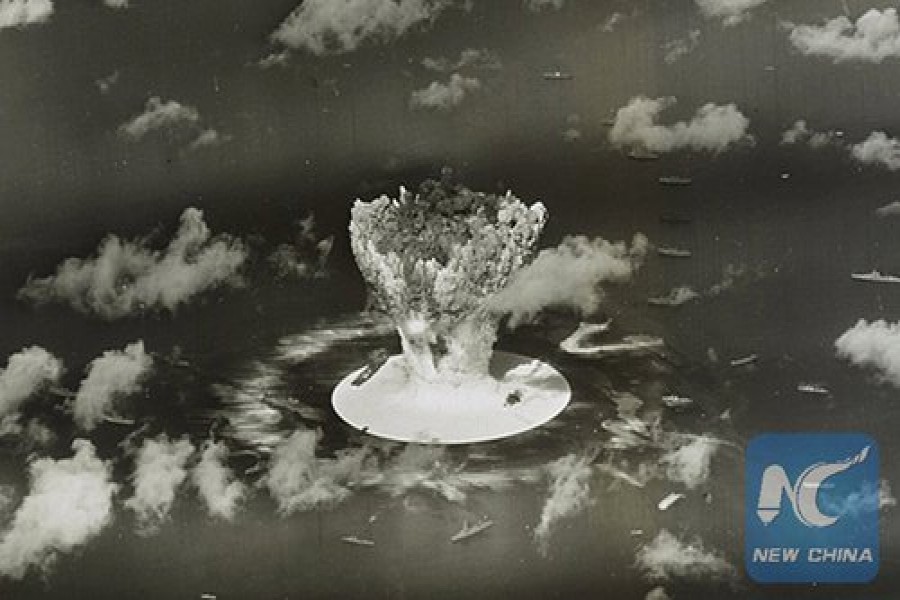The Los Angeles Times recently published a lengthy investigative report revealing that the US conducted several nuclear tests in the Marshall Islands between 1946 and 1958. The damage inflicted on the central Pacific group of islands and its people continues to this day. In the 1980s, the US built a giant dome in the islands to store the deadly radioactive remains of previous nuclear tests. No safety standards were followed to prevent radiation leakage. The building, now over 40 years old, still poses a risk of toxic radioactive leak from the rising sea level caused by climate change.
This is an old issue from history, but it had not been settled fairly until now, which reveals two distinctive features of US foreign relations.
The first feature is that Washington's standards are different for treating its own nationals and citizens of other countries. Imagine that safety of US citizens was threatened by nuclear risk as the one on the Marshall Islands, which was revealed by the media after decades, a political storm would have erupted in the US. But when it comes to citizens of other countries, the US government is dealing with it in a different way even though the United States Declaration of Independence states that "all men are created equal."
In 1988, to address the damage to the environment and local people by the nuclear tests and nuclear residues, the US government agreed to the setting up of a joint Marshall Islands-US court to probe the case. Finally, the court ruled that the US should pay the islands $2.3 billion in compensation. Even such a joint ruling involving the US was overruled by the US Congress and US court. The vetoes by the US Congress and the court gave various reasons for the decision, but the fundamental reason is that the recipient of the compensation is not US citizens.
This case is a very typical example of how the US has different standards when it comes to dealing with international disputes involving itself. The US often applies different standards on issues, and these standards are always based on self-interest rather than international ethics. The US only has "pink lines" and no "red lines" for US foreign policy. The shade of "pink" is determined entirely by American interests.
Another characteristic is that in dealing with disputes with other countries, Washington does not play by international rules but domestic ones. The fate of the Marshall Islands nuclear test residue disposal and adjudication case most typically reflects the principles of the US as a superpower: American domestic law is superior to international law, and domestic rules are superior to international rules.
Objectively, in the absence of an international ban on atmospheric nuclear testing at that time, the nuclear tests by the US in the Marshall Islands should not be condemned. However, how to dispose of the remnants of these nuclear tests and how to implement the ruling of the 1988 Marshall Islands-US joint tribunal are not only a matter of international ethics, but also directly related to the rights of the people of Marshall Islands to survival and development, as well as the authority of international law and rules.
Now the US often talks about "rules-based" approach, which we should welcome and encourage, and would like to kindly remind the US government and the US Congress: Should there also be a "rule" in dealing with nuclear security risks in the Marshall Islands, and should that "rule" also be the "basis"? If Washington had really played by the rules, the Los Angeles Times would not have reported it.
People with conscience must recognize a grim reality: Nationals of the Marshall Islands have become the victims of two deadly threats in the world. First, the threat of nuclear security. Since the 1980s, the international community has gradually developed more and more mature international rules and even technical arrangements for strengthening nuclear security and resolving potential problems in the field of nuclear security. The issue of nuclear security in the islands is not difficult to resolve. As long as the US treats the Marshallese people and the American people's nuclear safety issues equally and complies with international rules and security standards, the issue can be resolved fairly.
The other is the rise in sea level caused by climate change. The withdrawal of the US from the Paris Agreement and its failure to deal with the Marshall Islands nuclear issue in accordance with international rules are two different events, but a clear link in policy thinking can be seen. If every country overrides international ethics with its own national interest, and overrides international rules with domestic politics, there will be no international order and all members of the international community, including the violators themselves, will be harmed.


